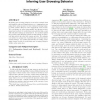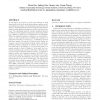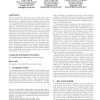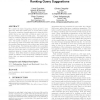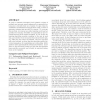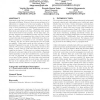157
click to vote
SIGIR
2012
ACM
13 years 4 months ago
2012
ACM
We demonstrate the merits of using inter-document similarities for federated search. Specifically, we study a resultsmerging method that utilizes information induced from cluster...
154
click to vote
SIGIR
2012
ACM
13 years 4 months ago
2012
ACM
Modeling user browsing behavior is an active research area with tangible real-world applications, e.g., organizations can adapt their online presence to their visitors browsing be...
163
click to vote
SIGIR
2012
ACM
13 years 4 months ago
2012
ACM
In this paper, we propose a novel top-k learning to rank framework, which involves labeling strategy, ranking model and evaluation measure. The motivation comes from the difficul...
149
click to vote
SIGIR
2012
ACM
13 years 4 months ago
2012
ACM
Ideally, students in K-12 grade levels can turn to book recommenders to locate books that match their interests. Existing book recommenders, however, fail to take into account the...
136
click to vote
SIGIR
2012
ACM
13 years 4 months ago
2012
ACM
Many techniques for improving search result quality have been proposed. Typically, these techniques increase average effectiveness by devising advanced ranking features and/or by...
153
click to vote
SIGIR
2012
ACM
13 years 4 months ago
2012
ACM
We consider the task of suggesting related queries to users after they issue their initial query to a web search engine. We propose a machine learning approach to learn the probab...
142
click to vote
KDD
2012
ACM
13 years 4 months ago
2012
ACM
In order to minimize redundancy and optimize coverage of multiple user interests, search engines and recommender systems aim to diversify their set of results. To date, these dive...
150
click to vote
KDD
2012
ACM
13 years 4 months ago
2012
ACM
Influential people have an important role in the process of information diffusion. However, there are several ways to be influential, for example, to be the most popular or the...
150
click to vote
WSDM
2012
ACM
13 years 9 months ago
2012
ACM
We present a new approach for personalizing Web search results to a specific user. Ranking functions for Web search engines are typically trained by machine learning algorithms u...
134
click to vote
CIKM
2011
Springer
14 years 2 months ago
2011
Springer
In this paper, we reveal a common deficiency of the current retrieval models: the component of term frequency (TF) normalization by document length is not lower-bounded properly;...

